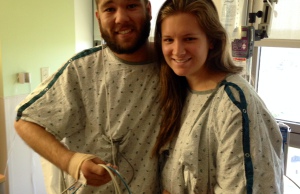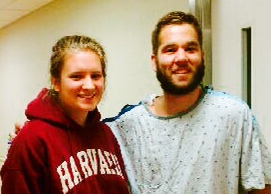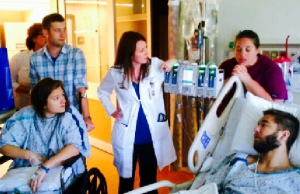Jt Thomas and Niki Borgeson don’t have a lot in common. They both went to FHN. They both graduated in 2010. They share a few mutual friends.
Not much in common. Well, unless you count kidneys.
HOW IT HAPPENED
Jt was a healthy high school student. He was always busy, well known around FHN, and even won Mr. FHN his senior year. He sailed through four years of high school with no health problems, not even  the slightest indication of what was about to happen.
the slightest indication of what was about to happen.
“In high school, Jt was super outgoing and really fun,” English teacher and StuCo sponsor Jani Wilkens said. “He had a great sense of humor and the staff really respected him. Everyone thought he was fun and he was very well liked.”
After beginning college at Mizzou his freshman year, Jt made the decision to come back home sophomore year and enrolled in classes at SCCC. Everything was still going fine and he was as healthy as ever. In late November 2011, though, he began to notice some symptoms. It felt like a run-of-the-mill cold, just a typical winter illness. After a few months, however, he was still feeling ill and became more concerned. A trip to the doctor in February told him he was fine, but the doctor told him to go to Mercy for precautionary blood tests.
The tests came back. On Feb. 11, 2012, Jt’s father John Thomas received a phone call from the doctor.
“They wanted to know if there was any way I could get ahold of him,” John said. “The doctor said it was urgent. He was hoping it was a mess up at the lab, but they needed to get the blood test redone.”
The lab was waiting for them when they arrived. The tests were carefully redone. The results came back again, and the panic mounted.
“They said they couldn’t believe he was walking,” John said. “He could have had a heart attack; he could have had a stroke. They said to drive him straight to the hospital, not to stop for anything.”
Jt was diagnosed with focal segmental glomerulosclerosis (FSGS), a scarring of the kidney. Doctors could not determine a cause of the disease, but told Jt his kidneys were failing. Because the kidneys filter toxins from the bloodstream, it is life threatening when they fail. It was clear that a transplant would be necessary. In the meantime, Jt started dialysis, a treatment that removes waste from the body and maintains safe levels of chemicals like potassium and sodium.
“It was out of the blue,” Jt said. “It took me, my family, and my friends by surprise. I had no medical history or heredity that would explain it. It honestly was out of the blue.”
When he heard the news, John immediately told the doctors he would donate his own kidney.
“I said take one of mine. Take thunder or lightning. Take anything you want,” John said. “He needed a kidney right then, and any parent would do that for their child. We had the same blood type, B-positive, but when they did the MRI scan, we found out I had a kidney stone and they said I couldn’t be used as the donor. They said if they took my kidney I could be in the same situation [as Jt]. It was about as devastating as you could think. It’s a powerless, horrible feeling when there’s nothing you can do.”
HOW HE FOUGHT
“He came up to North to visit,” Jani said. “It was pretty easy to see he had lost a ton of weight. He would update me on the whole situation. He started to lose color. It was something I never thought a young person would have to deal with. He was so weak. He would come in and just sit down right away because it was so exhausting.”
Jani continued to follow Jt’s search for a donor as it made its way onto Facebook. Especially because of his rare B-positive blood type, Jt was having difficulty finding a match.
“The average wait time for my blood type was 3-5 years,” Jt said. “I had to be on-call 24/7 in case a kidney popped up. At first I thought it was kind of a cheesy joke, but then I began to embrace B-positive as kind of a motto. I started right away on Facebook to bring attention to the need. I said, ‘There’s no pressure for people to donate, but if you want to, it’d be greatly appreciated.’”
Jt was still working to complete his second semester of sophomore year at SCCC, but as the weeks went by, his priorities changed. He was going to school, work, and four-hour dialysis treatments three times a week, taking several medications, and still unable to find a donor.
“I was feeling frustration, definitely a lot of frustration,” Jt said. “I wanted to go back to normal life. I didn’t hold it against anybody. It was just very scary.”
Many friends and family members were tested to see if they could be donors, but there was always a problem. Diabetes. Blood disorders. High blood pressure. No one could donate.
But then it happened.
HOW SHE FOUND OUT
“Within days after he originally went to the hospital, I saw it on Facebook,” Niki said. “I guess I didn’t realize how severe it was. I figured, he was young, things will go back to normal soon. People our age don’t get seriously sick.”
Things didn’t go back to normal. Niki, who was in the pre-medicine program at Whitworth University in Spokane, WA, watched as the posts continued.
“In May 2012, someone posted on Facebook, ‘If you’re blood type this or this, think about seeing if you’re a match.’” Niki said. Niki’s blood type is O-negative, which makes her a universal donor. “After I knew I was possibly a match, I told my parents and some friends. My parents said, ‘We think it’s really great, but we don’t know who this person is; you shouldn’t do that.’”
Even though Niki’s parents didn’t like the idea, it stuck with Niki through her next year of college.
“I thought about it everyday — I have two kidneys and I’m healthy and there’s no reason I couldn’t,” Niki said. “I think if you asked my friends, they would have described it as a guilty conscience. Just because he wasn’t my best friend or brother didn’t make him any less worthy of a kidney.”
Niki’s mother was a physician’s assistant to the surgeon that would eventually perform the transplant. She brought up many concerns she had from her experiences seeing life after donation, including her worry that women who donated had trouble getting pregnant. Niki began doing research to find out what the risks would be.
“Google ‘becoming a kidney donor,’” Niki said. “I’ve read every website that comes up several times. I was just like, maybe there’s some truth in what my mom was saying, but I wanted to make sure.”
Niki talked to Greg Felock, a friend of both her and Jt, over the course of several months about potentially being a donor. Then, something happened that convinced her she was absolutely sure.
“As a pre-med student, you have to have a certain number of hours of experience,” Niki said. “I got the chance to watch a full kidney transplant. I decided that day I would do it. I think it was, while watching, the surgeons telling me about the recovery for the donor, that it was a fairly routine procedure and that the risks were very low. I was expecting it to be a lot more than it was.”
The next day, Niki called Jt.
“I was shocked,” Jt said. “I tried to keep it as hush hush as possible because it was not guaranteed to work out, but I had guarded optimism. There were a lot of tears of joy from both family and friends and a lot of excitement. I’m not afraid to say I cried.”
Next came the tests. Blood tests, urine tests, chest X-rays, EKGs, blood pressure tests. All came back with good news.
“It felt like I was floating,” Jt said. “It was an overload of endorphins. She never had any doubts; she wasn’t backing out.”
After that summer, Niki had to return to Spokane for another year of school. The surgery was to take place the following summer once she graduated. But, Jt still had a long year of dialysis to complete.
“I was going to dialysis for 12 hours a week,” Jt said. “At one point I calculated I spent more than 60 full days
receiving dialysis. You start to imagine what you could have done with that time. But, you get used to it. If you take it seriously and it means that much to you, you’ll do what it takes to be successful.”
HOW SHE CAME ALL THE WAY HERE
On May 24, 2014, Niki arrived in St. Louis. Jt and Niki met for the first time since graduating together four years earlier.
“I don’t know if I’ve ever hugged a person that tight before,” Jt said. “I had to be careful not to damage the kidney.”
Niki had her final bloodwork and CT scan over the next several days, and the surgery date was set for June 24. A few days after Niki arrived in St. Louis, Niki, John and Jt went out to lunch.
“I wanted to meet the person doing it,” John said. “The first time I met Niki, she was one of the most pleasant, spunky, and easy to talk to people I’ve ever met. She came to St. Louis just to do this — it was huge. I still clearly remember her describing herself as freakishly healthy. Some divine intervention kept me from donating that allowed her to give him a healthy kidney. It all fell into place.”
HOW SHE SAVED HIM
June 24 came. Jt’s alarm went off at 4 a.m.; Niki’s at 4:45 a.m. Neither ate; they weren’t allowed to before the operation. They both arrived at Barnes-Jewish Hospital in St. Louis at 5:30 a.m. and registered for surgery.
One last bear hug for Niki from Jt.
A fear that a problem might arise at the last minute.
An anxious three hours in the waiting room.
A moment of panic when the doctors tell Niki to say goodbye to her family.
I love you’s.
Two beds wheeled to two operating rooms.
Three hours of waiting.
And then, it was all over.
HOW IT ALL TURNED OUT
“It worked immediately,” John said. “It was total joy. There was such a big smile on his face; you couldn’t wipe it off if you tried.”
Jt had a new, working kidney. He had his life back. But, a few little things mattered more than anything else at that point.
“I could pee again,” Jt said. “Over two years had gone by when I didn’t have the urge, ability or kidney function to do it. I also had a fluid drain that couldn’t get too wet, so showering was a challenge. I had to avoid getting it wet in very acrobatic ways.”
Niki was also able to recover quickly, with only a few minor effects.
“The toughest thing was they had to take a chunk out of my ribs because I have a small ribcage,” Niki said. “It was like a cramp in my ribs that didn’t go away for a couple weeks. Other than that, it doesn’t have much effect at all. I’m a big snowboarder, so I’II have to be more careful, but it’s really things everyone should do.”
Jt and Niki now share a special kind of bond that very few people have. Looking back at their days in high school it’s hard for them to believe the turn of events that took place over the past three years.
“If you had told me while I was in high school that this was going to happen, I would have laughed,” Jt said. “In high school I had no health issues; it wasn’t something I could fathom. Over the last two and a half years, I’ve nearly lost my life three times. I can’t compare the bond I have with Niki to anything because she literally saved my life.”
John could not be more grateful for the life that Niki gave back to his son through her kidney donation.
“It gave me hope that good things can happen. There are good people in the world and Niki is one of them,” John said. “She’s like an angel. She saw him in pain and suffering and was able to bring him back to life with a piece of herself. She’s a gift.”
Jani was inspired by how FHN connected Jt and Niki’s lives after graduation, even though they barely knew each other while in high school.
“It made me feel so proud of where I work,” Jani said. “It reaffirmed for me that the students who leave here are really cool people. Someone cared about someone else that much, and they were affiliated by their high school. It’s so amazing that those are the kind of people we graduate from North. It’s a moment everyone can be proud of.”













![The Move Out [Personal Column]](https://FHNtoday.com/wp-content/uploads/2025/04/Copy-of-Mckenna-Hudson-Tales-of-a-child-delinquent-e1745412970237-1200x800.png)







